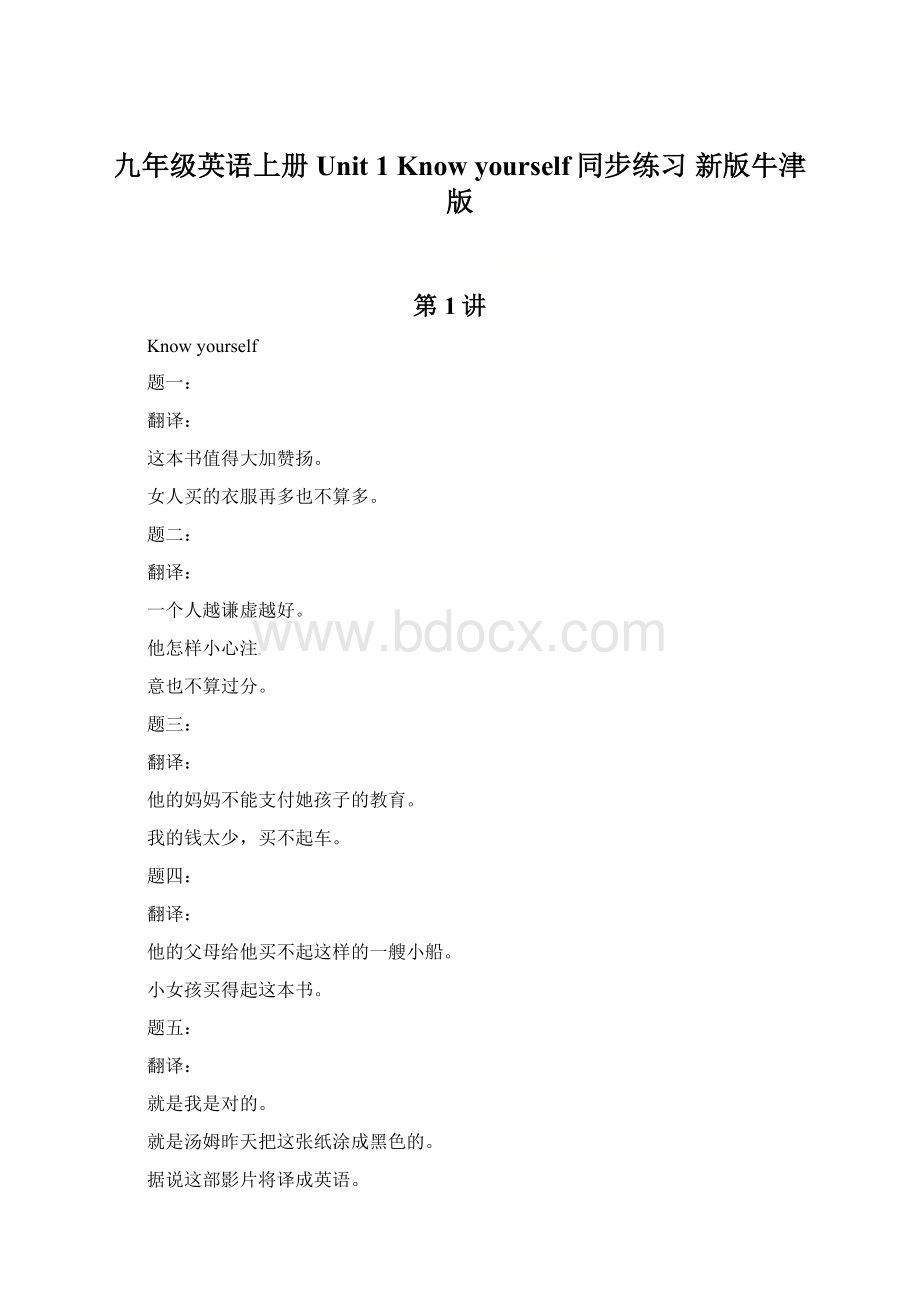九年级英语上册 Unit 1 Know yourself同步练习 新版牛津版Word文档下载推荐.docx
《九年级英语上册 Unit 1 Know yourself同步练习 新版牛津版Word文档下载推荐.docx》由会员分享,可在线阅读,更多相关《九年级英语上册 Unit 1 Know yourself同步练习 新版牛津版Word文档下载推荐.docx(11页珍藏版)》请在冰豆网上搜索。

仔细考虑一下,你就会找到方法。
我爷爷80多了,但身体依旧健康。
你可以坐这头或者那头。
前门锁上了所以我绕到了后门。
纽约和伦敦都存在交通问题。
题一十二:
查理接手了这份工作,他做得很好。
他们感到很无聊但是仍然在听他说。
我姑姑问我喜欢牛仔裤还是裙子。
下月我才可以买新电脑,所以现在我还得用这台旧的。
她和我都擅长英语。
题一十三:
她不仅弹钢琴而且拉小提琴。
不仅我,汤姆和玛丽也都喜欢看电视。
他不是疯了就是醉了。
你可以喝茶或咖啡。
她既不喜欢黄油也不喜欢乳酪。
今天父母都不在家。
题一十四:
他们不仅在教室说英语,而且在寝室也说英语。
不仅是学生,老师也每天读英语。
你可以去游泳也可以去打网球。
那个女孩高兴时,她要么喜欢唱要么喜欢跳。
他既不是医生也不是老师。
我父母和姐姐中午都不在家吃饭。
题一十五:
1isaresultofthestudentactivitysurveyatourschool.Moststudentsexercisethreeorfourtimes2week.Somestudentsexerciseonce3twiceaweek.Somestudentsexerciseeveryday.4homework,moststudents5homeworkeveryday.Somestudentsdohomeworkmorethanthreetimes.6studentsdohomeworkonceortwiceaweek.Theresultfor“watchTV”is7.SomestudentswatchTVonceortwiceaweek.SomewatchTVthreeorfour8aweek.ButmoststudentswatchTVeveryday.9thinkit’shelpfulforthem10TV.Theycanberelaxedandlearnmuchknowledge(知识)bywatchingTV.
1.A.HereB.ThereC.Here’sD.There’s
2.A.aB.anC.theD./
3.A.andB.butC.orD.so
4.A.WithB.ByC.ToD.Asfor
5.A.didB.doC.doesD.doing
6.A.NotB.NoC.NoofD.Noone
7.A.interestingB.interestsC.interested
D.interest
8.A.timeB.timesC.atimeD.sometime
9.A.TheyB.TheirC.ThemD.Theirs
10.A.watchB.towatchC.watchesD.watching
题一十六:
Once,therewasawilddonkey(驴)andatame(驯养的)donkey.
Thewilddonkeywasthinandsmall.Hespenthislifein
the1.Thegrassonthehillwashisfoodalltheyeararound.Sometimes,hehadtowalkmilestofindcleanwaterandatnighttherewasalways2fromlions.Thetamedonkeywasmuchfatterand3.Duringsummer,theownerfedhimgrasswhilein4,hewasgivencornandhay(干草)toeat.Therewasalwayscleanwaterforhimto5andatnighthestayedinsidesafely.
Thewilddonkeyalwayswishedhecouldlive6thetamedonkey.
Oneday,thewilddonkeywaslookingforgrassonthehill.Lookingdown,hesawthetamedonkeywalkingslowlyalongtheroa
d,7heavywood.Ashewatched,thetamedonkeystoppedtoeatsome8bytheroadside.Suddenly,hisownerbegantodrivehimwitha9.
“Idon’twantyourwayoflife,”thoughtthewilddonkey.“Iseethatyouhavetopay10forthefoodtheygiveyou.”
1.A.houseB.zooC.wildD.river
2.A.dangerB.noiseC.drinkD.food
3.A.tallerB.shorterC.weakerD.stronger
4.A.springB.summerC.autumnD.winter
5.A.eatB.smellC.drinkD.feel
6.A.withB.withoutC.likeD.unlike
7.A.cuttingB.carryingC.eatingD.burning
8.A.grassB.meatC.fishD.water
9.A.stickB.knifeC.forkD.string
10.A.easyB.easilyC.heavyD.heavily
Knowyourself
Youcannotpraisethebooktoomuch.
Awomancannothavetoomanyclothes.
解析:
1.cannot…too...译为“不可能太……,无论怎样……也不算过分,越……越……”。
2.cannot…too...译为“不可能太……,无论怎样……也不算过分,越……越……”。
Onecannotbetoomodest.
Hecannotbetoocautious.
Hismothercouldn’taffordtopayforherchild’seducation.
IhavesolittlemoneythatIcannotaffordacar.
1.affordtodosth.“有足够的......去做某事,做某事负担得起”。
2.affordsth.负担得起某物。
Hisparentscouldn’taffordtobuyhimsuchaboat.
Thelittlegirlcanaffordthisbook.
ItisIwhoamright.
It
was
Tom
who
painted
the
paper
black
yesterday.
ItissaidthatthisfilmisgoingtobetranslatedtoEnglish.
ItisknownthatChinaisacountrywithalonghistory.
Itisreportedthattherewillbeaheavyraininadayortwo.
ItisbelievedthatProfessorJohnsonhasfinishedhissecondnovel.
1.我们
常用Itis/was...
who/that结构来突出强调句子的某一成分。
如果被强调的成分是表示人的词,用who或that来连接都可以。
如果是其它成分,则一律用that来连接。
2.我们常用Itis/was...
3.Itissaidthat...据说......
4.Itisknownthat...众所周知……,人们认为……
5.Itisreportedthat...据报道……
6.Itisbel
ievedthat...据说……据信……
ItwasIwhometLiMingattherailwaystationyesterday.
Itisthestudentswhoarelovely.
Itissaidthattheyfearwhichtheydonotknow.
ItisknowntoallthatProfessorWangwillgiveusalecturetomorrowafternoon.
Itisreportedthatthetemperatureisgoingtodropt
onight.
Itisbelievedthattheworld’spopulationwillincreasetoaboutninebillion.
1.我们常用Itis/was...
6.Itisbelievedthat...据说……据信……
Thistripwasjustforfun.
AtthebeginningIstartedtomodifyphotosjustforfun.
1.forfun的意思是“好玩、开个玩笑”。
2.forfun的意思是“好玩、开个玩笑”。
Shedrawsjustforfun.
Sportsismostoftenplayedjustforfun.
2.forfun的意思是“好玩、消遣”。
Ihopetoworkwithyou./IhopethatIworkwithyou.
1.hopetodo/thatsth.希望做某事。
Ihopetomakef
riendswithyou./IhopethatImakefriendswithyou.
Think
it
overandyou
will
find
a
way.
My
grandfather
is
in
his
eightiesbuthe
still
good
health.
You
may
sit
at
this
endoryou
that
end.
The
front
door
lockedso
I
went
round
to
back
door.
Both
New
York
and
London
have
traffic
problems.
1.并列连词and译为“和,又”,表示并列关系,常用来连接表示对等成分的单词、短语或者句子,表示意思的顺延或增补。
2.并列连词but译为“但是”,表示转折关系,所连接的成分意思相反或相对。
3.并列连词or译为“或者”,表示选择关系。
4.并列连词so表示“因此、所
以”之意,常用来连接两个简单句,这两个简单句有意思上的因果关系。
5.both...and..
.“双方都”,连接句子的两个主语时,谓语动词通常用复数形式。
Charlie
took
joband
he
did
very
well.
They
were
boredbutthey
listened
him.
aunt
asks
whether
like
jeans
or
skirt.
can’t
buy
new
computer
until
next
monthso
use
old
one
now.
she
are
English.
4.并列连词so表示“因此、所以”之意,常用来连接两个简单句,这两个简单句有意思上的因果关系。
5.both...and...“双方都”,连接句子的两个主语时,谓语动词通常用复数形式。
She
plays
not
only
piano
but
also
violin.
Not
Mary
fond
of
watching
television.
He
either
mad
drunk.
can
haveeither
tea
coffee.
She
likes
neither
butter
nor
cheese.
Neither
Dad
Mom
home
today.
1.not
only...
(also)...在句中常用来连接两个对等的成分。
表示“不仅......而且......”。
2.not
(also)...
用来连接两个主语时,谓语动词的单、复数遵循“就近原则”,即和but
(also)后的名词或代词的数一致。
3.either...or...用于连接两个表示选择关系的名词或代词,译为“要么......要么......”。
4.either...or...用于连接两个表示选择关系的名词或代词,译为“要么......要么......”。
5.neither...nor...表示“既不……也不……”。
其含义是否定的,可连接任意两个并列的成份。
6.neither...nor...连接两个主语时,遵循“就近原则”。
They
speak
English
class
dormitory.
students
teacher
reads
every
day.
eithergo
swimming
play
tennis.
When
girl
happy,
likeseither
singing
dancing.
Heisneitheradoctornorateacher.
my
parents
sister
has
lunch
home.
1-5AACDB6-10BABAB
1.考查名词及语境理解。
由文章后面内容得知,这是一篇调查结果。
句意:
这是一篇我们学校学生活动的调查结果。
A这里;
B那里;
C这是;
D那是;
由于句中已经有系动词is,所以选A。
2.考查冠词及语境理解。
由后面的week周,以及前面的threeorfourtimes三到四次可以看出,此句为:
大多数学生一周锻炼三到四次。
Threeorfourtimesaweek,一周三到四次。
故选A。
3.考查连词及语境理解。
从前文的once一次,及后面twice两次可以得出答案,此句为:
有些学生一周锻炼一到两次。
A和;
B但是;
C或者;
D所以;
故选C。
4.考查介词及语境理解。
从文中后文可知,后面写的是关于家庭作业的,句意:
至于家庭作业,很多学生……;
B通过;
C到;
D至于,关于;
故选D。
5.考查动词及语境理解。
从后文Somestudentsdohomeworkmorethanthreetimes一些学生一周做家庭作业超过三次。
可知此句也是关于做家庭作业的,句意:
大多数学生每天做作业。
主语是moststudents,是复数,所以谓语动词用原形,故选B。
6.考查代词及语境理解。
从给出的选项可知此句:
没有学生一周只做一两次作业。
A不,是副词,不能做主语;
B不是,形容词,不做主语;
C没有…of后面要接宾语;
D没有人,后不能跟名词。
故选B。
7.考查形容词及语境理解。
从给出的选项得知此句为:
关于看电视的调查很有趣。
A有趣的,形容词,用来形容物;
B使感兴趣,动词;
C感兴趣的,形容词,用来形容人;
D使感兴趣,动词;
结合题意,这里要用形容词修饰result,故选A。
8.考查名词及语境理解。
结合前文知道,这里讲的都是学生看电视的次数,所以此句为:
一些人一周看三到四次电视。
A时间,次数,是单数;
B次数,复数;
C一段时间;
D一些时间;
结合题意选B。
9.考查代词及语境理解。
结合选项可知此句为:
他们认为看电视对他们有帮助.A他们,主格;
B他们的,形容词性物主代词;
C他们,宾格;
D他们的,名词性物质代词。
句中缺主语,故选A。
10.考查动词及语境理解。
结合选项意思,此句为:
他们认为看电视对他们有帮助。
It’shelpfulforsb.todosth.做某事对某人是有帮助的。
后面用动词不定式,故选B。
1-5CADDC6-1
0CBAAD
1.考查语境理解及名词。
house房子;
zoo动物园;
wild荒野;
river河流。
联系前一句描述,可知此处指的是,这头野生的驴生活在荒野当中。
2.考查语境理解及名词。
danger危险;
noise噪音;
drink饮料;
food食物。
联系下文,可知此处指的是,来自狮子的危险。
3.考查语境理解及形容词。
taller更高的;
shorter更矮的;
weaker更虚弱的;
stronger更强壮的。
联系前文fatter,可知此
处指的是,更胖更强壮。
4.考查语境理解及名词。
spring春天;
summer夏天;
autumn秋天;
winter冬天。
联系下文,给它谷物和干草吃。
可知此处指的是冬天。
5.考查语境理解及动词。
eat吃;
smell闻起来;
drink喝,饮用;
feel感觉。
联系前文,可知此处指的是,它总有干净的水喝。
6.考查语境理解及介词;
with带有,伴随;
without没有;
like像……一样;
unlike和……不同,不像。
结合语境可知此处指的是,他希望他能像被驯养的驴一样生活。
7.考查语境理解及动词。
cutting砍;
carrying运送,携带;
eating吃;
burning燃烧,灼伤。
结合语境可知此处指的是,这头被驯养
的驴正在运送沉重的木头。
8.考查语境理解及名词。
grass青草;
meat肉;
f